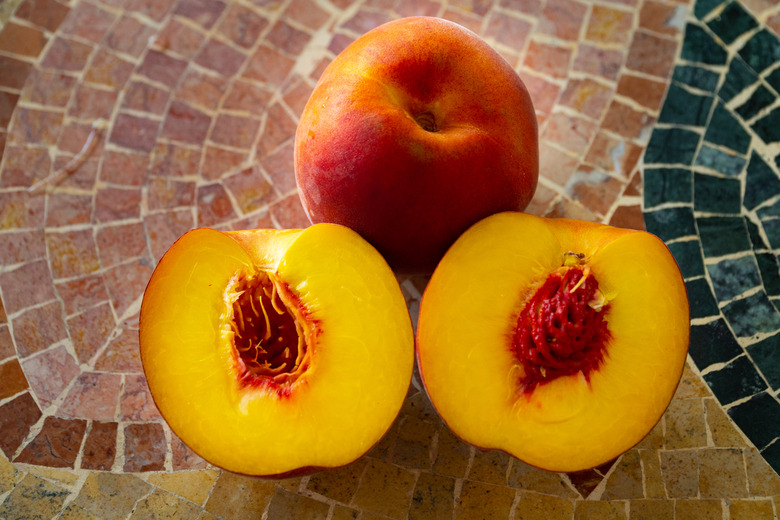Problems Associated With Swallowing Fruit Seeds
You remember the warnings from childhood. "A tree will grow in your stomach and kill you!" "You can be poisoned by peach pits!" "Swallowing apple seeds will put you in the hospital!" You learned to spit them out and throw them away. But how much is fact, and how much is urban legend?
Many Seeds Contain Cyanide
Many fruit seeds, including apples, cherries, peaches and apricots, contain amygdalin, a compound of cyanide and sugar. Amygdalin breaks down into the deadly poison hydrogen cyanide (HCN) when digested. However, the risk of cyanide poisoning from accidentally swallowing cherry seeds and other fruit seeds that contain amygdalin is very low.
According to the Cornell College of Agriculture and Life Sciences, the amount of cyanide ingested when eating apples or pears is so minimal that one would have to ingest large quantities of these fruits before suffering ill effects of this toxin. A person's body will simply detoxify the substance and harmlessly pass it. Additionally, these seeds have a thick coating which protects them through the digestive process.
Peach and apricot pits contain amygdalin in higher amounts, but those seeds are too large to swallow accidentally. And you'd have to pry open the pit to get at the cyanide-bearing kernel in the first place.
Choking Hazard from Seeds
Parents should be especially careful not to give their babies fruit with seeds inside, especially fruits with large seeds. For a child to swallow a cherry seed, for example, may increase his chances of choking than if he swallowed a smaller seed. It's important to note, however, that all seeds, present a choking risk. Even snack foods like sunflower or pumpkin seeds can be problematic. It's too easy for a baby to inhale the seed or choke on it. Play it safe and don't give your baby seeds until age 3.
Potential Intestinal Injury from Seeds
Swallowing seeds whole presents a small risk of intestinal injury. Sharp edges, such as the pointed ends of apple and pear seeds, have the potential to tear or perforate the intestines. Swallowing a large number of seeds can result in intestinal blockage or obstruction. These aren't common problems, but if you experience fever, nausea, vomiting or severe abdominal pain after swallowing seeds, seek medical help immediately.
Low Possibility of Appendicitis
The common belief that swallowing seeds can cause appendicitis is factual, but incidents are exceedingly rare. The National Library Medicine reports that out of 1,969 cases of acute appendicitis that required surgery between 2002 and 2009, only one was because of a fruit seed lodged in the appendix.
Debunked Seed-Swallowing Myths
If you grew up believing the scare story about a tree in your tummy, you can breathe a long-overdue sigh of relief. The environment in your stomach is inhospitable to seed germination. Seeds need oxygen to sprout, and there's none to be had in your stomach. Also, even seeds that typically would germinate quickly in three to five days under optimal conditions have already traveled through the digestive system before they're excreted.
Many fruit seeds require a chilling period before they can sprout, a condition that does not exist in the warm environment inside a human body. For example, the University of Kentucky notes that a black cherry seed needs to remain chilled for 120 days before it will sprout. Rest assured; swallowing seeds won't turn you into a walking greenhouse.
